
VITURE Pro XR Glasses - In-Depth Review and Analysis of Your Next Personal Cinematic Experience

VITURE Pro XR Glasses - In-Depth Review and Analysis of Your Next Personal Cinematic Experience
Key Takeaways
- Viture’s Pro XR Glasses provide a relatively low-cost, multiplatform alternative to dedicated AR/VR devices.
- They offer sharp display quality, broad connectivity options, and a well-balanced, comfortable design.
- The Pro XR Glasses have innovative features and strong compatibility when using the right accessories, making them a versatile choice.
XR, or extended reality, promises augmented reality (AR), virtual reality (VR), and mixed reality (MR) in one. A device like Apple’s high-profile Vision Pro certainly fits the XR definition, but its sky-high price and closed ecosystem present some real barriers to entry. Viture, with its newest generation of extended reality products, aims to deliver a relatively low-cost, multiplatform alternative with the Viture Pro XR Glasses . Although they can’t compete on style or seamless integration, the product does a solid job of delivering genuinely useful and entertaining features for a relatively low price.
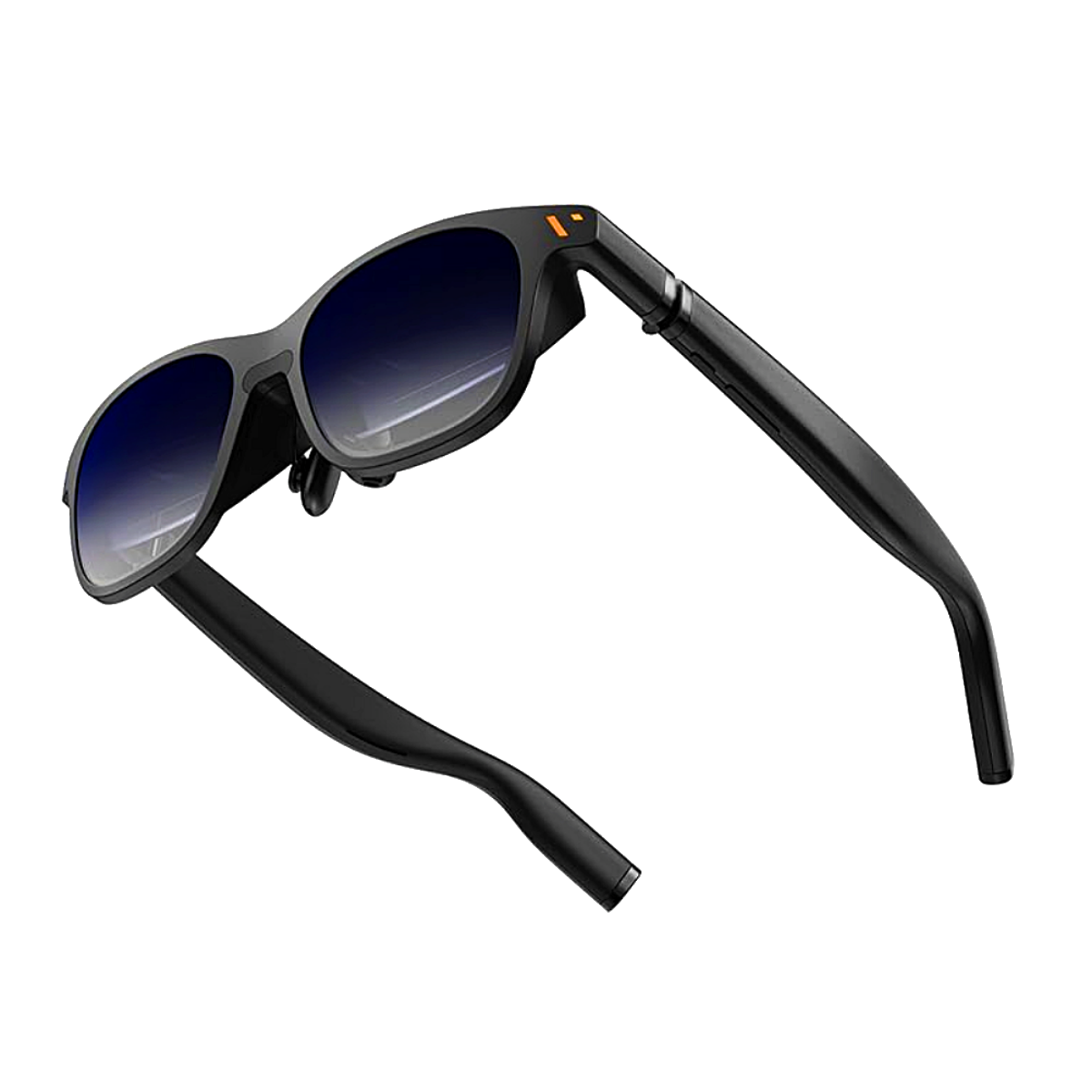

Viture Pro XR Glasses
8/ 10
Extended reality glasses with a 135-inch display and a wide range of connectivity options.
Pros
- Bright and clear virtual 135-inch display
- 1080p resolution at 120Hz
- Full SBS 3D video
- Adjustments for vision prescriptions
- Lots of connection options
Cons
- Connection options can sometimes be confusing
- Additional accessories are needed to connect to some devices
- Connected devices can lose battery faster
- Interior lens glare in well-lit environments
- No HDR support
How We Test and Review Products
Price and Availability
Viture’s premium packaging for the Pro XR Glasses is some of the best I’ve seen, even giving Apple a run for the money. The fold-out falcon wing box is high-quality, with cabling, paperwork, glasses, and glasses case all compartmentalized. It’s a great first impression. They’re available in black on Amazon for $459, or in Marshmallow (white) on the Viture website.
Out of the box, the Pro XR Glasses can connect directly to any capable device , such as laptops, gaming handhelds, smartphones, and tablets, over its USB-C DisplayPort (DP) input, which is also compatible with Thunderbolt 4. Various optional accessories, including a Neckband, which acts as a standalone Android-based device, a mobile dock, iPhone adapters, and more, enhance its compatibility and functionality.
In short, although the interface options can get a bit confusing, the Pro XR Glasses can connect with just about any modern computer, console, or mobile device either natively or in combination with one of its add-ons.
Specifications
Functions
XR, AR, VR, 3D
Sunglasses?
Electrochomic Film
Resolution
1920 x 1080
Refresh rate
120 Hz
Speakers
HARMAN AudioEFX
Weight
2.7 oz
Connectivity
USB-C DP
Expand
Form and Functionality: Chunky High-Tech Glasses
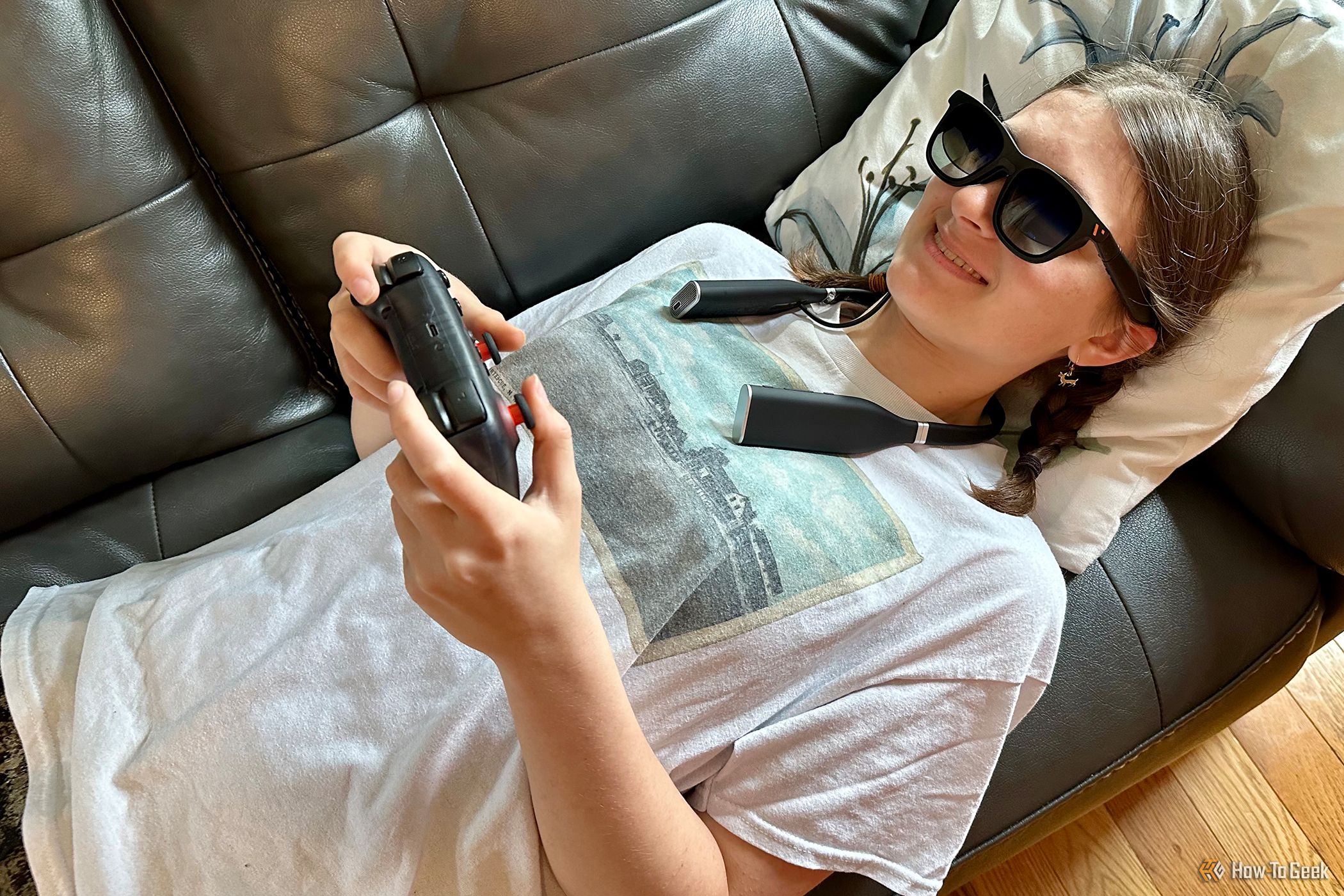
Bill Loguidice / How-To Geek
Head-on and from the side, the Pro XR Glasses could pass for a regular pair of sunglasses. From above or below, you can see that not only are the arms , or temples, thicker than usual, but also the lens area, which is about 0.85 inches at its apex. What really gives away that these are no ordinary glasses is that the front lenses, where the screens reside, sit further away from your eyes.
There are four sizes of nose pads to choose from, including a flat one, labeled “1.” The “2” nose pad is pre-installed, with each higher number raising the glasses that much higher at the top of your nose. I found using 1 was best for the shape of my upper nose area. The image was well-centered versus the others that cut off the bottom of the display. Everyone else in my five-person family needed to swap out different nose pads to get the image centered for their particular faces. It’s not a big deal to slide these pieces in and out, but a magnetic connection would have been more convenient for those who share a single pair of glasses.
Close
Along with the nose pads is an anti-clip hair cover to prevent long hair from getting caught in the magnetic port located on the outside of the right temple tip end. Overall, the roughly 2.7-ounce weight of the Pro XR Glasses was well-balanced and reasonably comfortable for several hours of use at a time.
Each lens has a rotary knob that can be turned clockwise up to -5.0D (500 degrees) until you have a clear image. While this is primarily designed for users with myopia, or nearsightedness, this adjustment can help fine-tune clarity for anyone. If greater adjustments are needed, such as for -6.0D and beyond, or astigmatism, the Prescription Lens Frame is an optional accessory.
The Pro XR Glasses have an equivalent display size of up to 135-inch display viewed from roughly 10 feet away. Each eye displays 1,920 x 1,080 at up to a 120Hz refresh rate, with Full SBS (Side-by-Side) 3D video support at an effective resolution of 3,840 x 1,080 and 60Hz refresh rate, including for 3D games and 3D Blu-ray movies. Peak brightness is a blistering 4,000 nits, although only 1,000 nits is actually perceived. Regardless of the technical details, the screen is sharp, fast, and clear in actual usage, even at the edges, and a big step up from the previous generation of these types of glasses.
On the interior of each temple are speakers powered by Harman’s AudioEFX , which helps improve sound versus what’s typically found in portable devices. The reverse sound field design reduces noise leakage to a rated 30 decibels, roughly the sound of a whisper, at a distance of 8 inches from the speakers, helping to maintain sound quality with minimal outside disturbance. While I absolutely prefer using my own wireless earbuds with the Pro XR Glasses, the built-in sound is certainly passable for a portable device such as this.
One important thing to note is that if you’re in a well-lit room, or outdoors, and there’s bright light behind you, you’ll see reflections on the interior lens, which can be a bit distracting. This can be minimized by changing your angle, lying down, or being in a darker environment, but it’s definitely an area for improvement in the next generation of this product.
Primary Display, Gaming, and XR: Hardware and Software Come Together
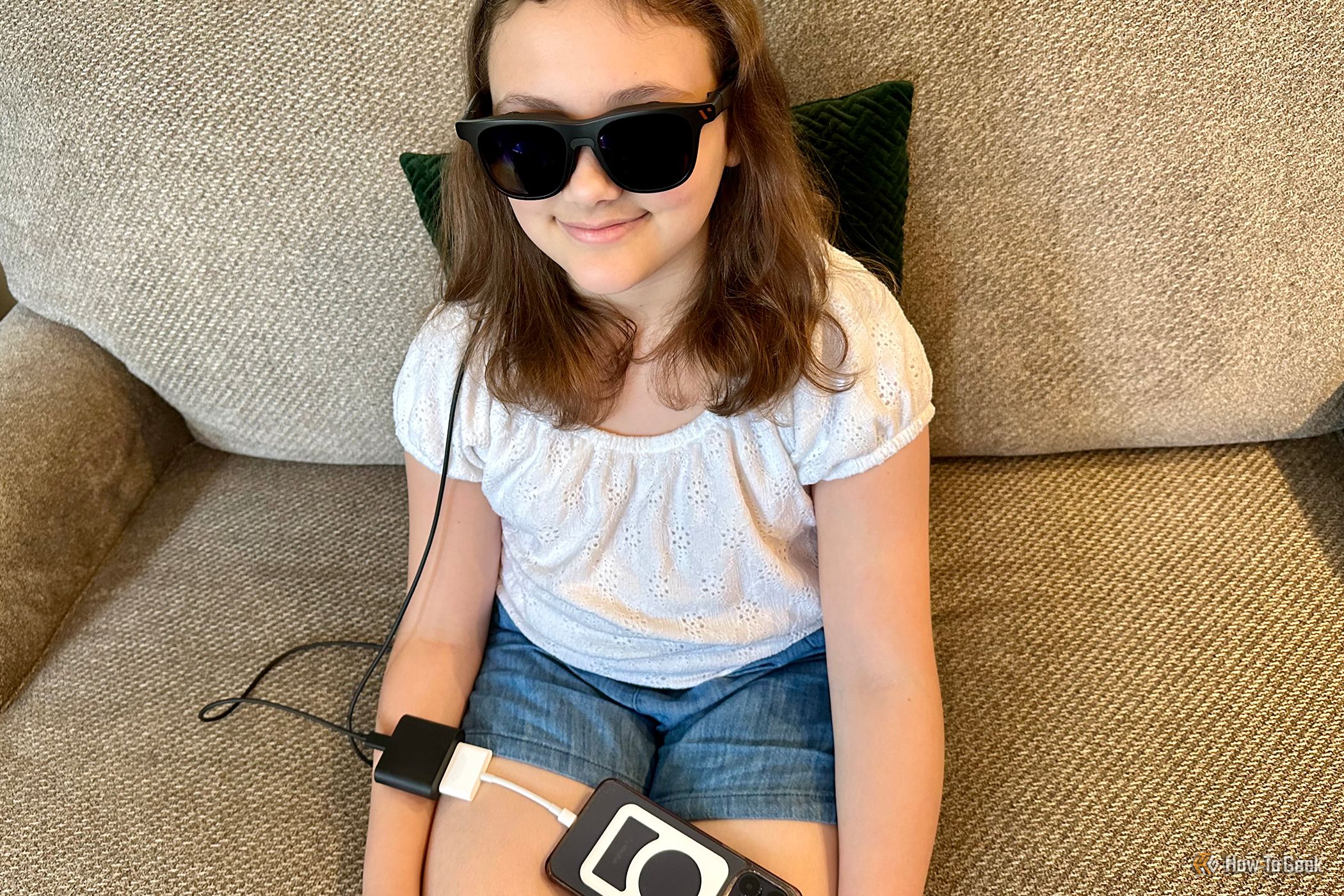
Bill Loguidice / How-To Geek
By default, connecting the Pro XR Glasses is as simple as attaching the USB-C-based DP cable to a compatible device. If a device has a USB-C port that outputs video, it should just work. I successfully tested this on a Steam Deck , Nintendo Switch OLED, Lenovo LOQ 15IAX9I laptop , and a Samsung Galaxy Tab S7+, each immediately connecting and displaying flawlessly.
Of course, with something like the Samsung Galaxy Tab S7+, the 1,920 x 1,080 resolution of the Pro XR Glasses is much lower than the tablet’s native 2,800 x 1,752. This resulted in a display that was not particularly sharp, but once I entered DeX mode, all that changed. With DeX, I was able to use my Bluetooth trackball and keyboard to create a wonderfully functional, and sharp, virtual desktop computing experience with the native resolution of the Pro XR Glasses. Just like with the Lenovo LOQ 151IAX9I laptop, this not only creates an intriguing portable monitor setup but can also provide privacy in a public environment like a coffee shop. While the strange looks you’ll get may ultimately not be worth it, acting as a private display remains a genuine use case.
Unfortunately, since the Pro XR Glasses do not have their own power source, it draws power from the USB-C port of the device it’s connected to. With my original Steam Deck, this translated to losing roughly one percent of battery life for every minute I was using the display. For devices that can connect to other power sources at the same time, this is not really an issue, but for devices like the Steam Deck or Switch, or actually connecting common HDMI-based devices, you’ll want to take advantage of some optional accessories.
The updated Viture Pro Mobile Dock ($129) is pretty much a must-have accessory, sporting a 13,000mAh battery in a compact case, and the same features as its predecessor , just with better discharge efficiency for extended battery life. The dock provides up to eight hours of battery life with the Nintendo Switch, up to three hours with the original Steam Deck, and up to 20 hours with HDMI-based devices.
The Pro Mobile Dock has an HDMI 1.4 input for connecting HDMI-based devices like the Microsoft Xbox Series X, Sony PlayStation 5, or Apple TV, as well as the same type of USB-C DP input found on the glasses, allowing devices additional ways to connect and power. You then plug your Pro XR Glasses into the first glasses USB-C port on the Mobile Dock, and can even connect a second pair of Pro XR, One XR , or One Lite XR Glasses to the second glasses USB-C port for multiplayer gaming or watching the same video.
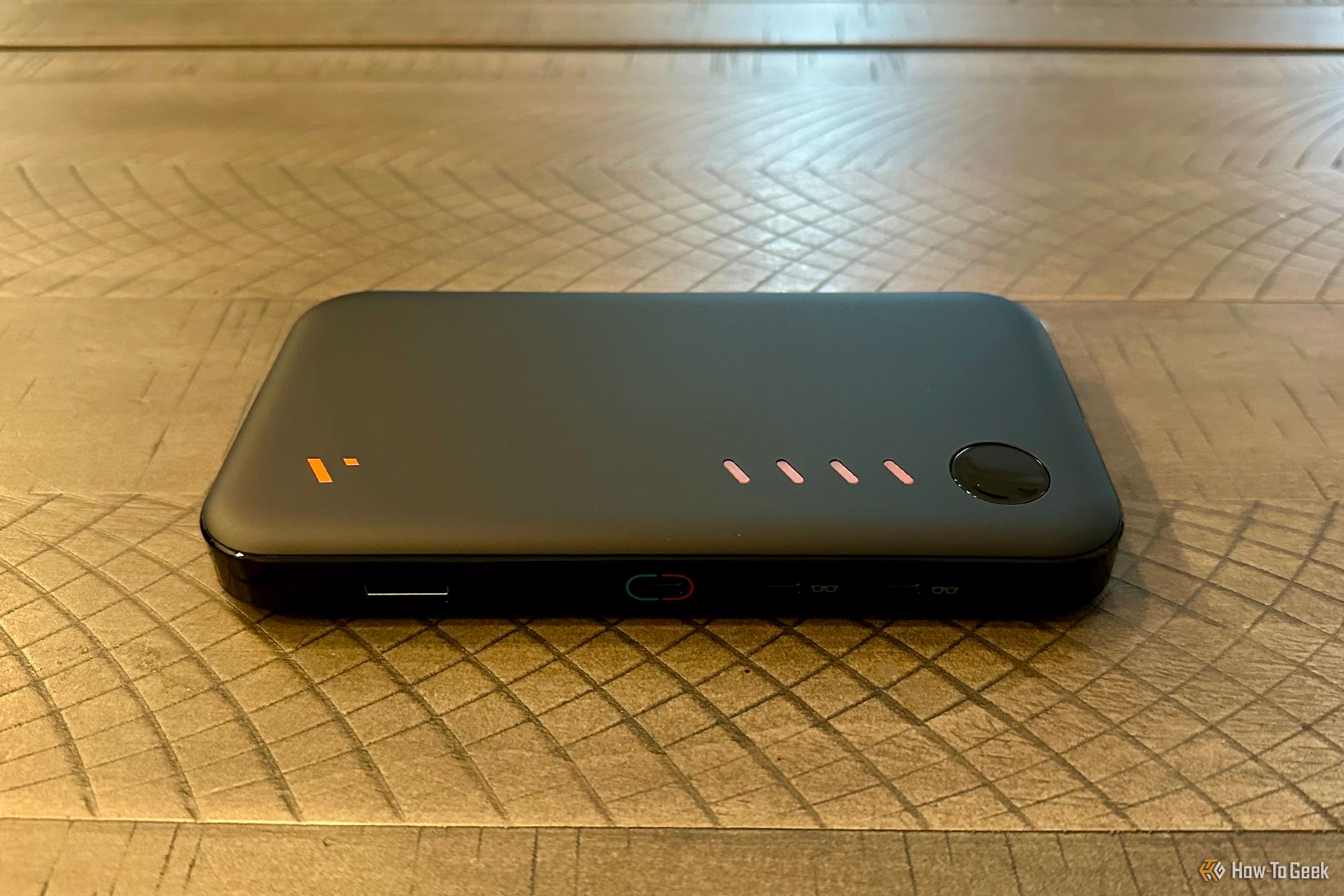
Bill Loguidice / How-To Geek
While the Pro Mobile Dock is a universal solution, Viture also makes Mobile Dock Mounts ($19) specifically for Nintendo Switch and Steam Deck . These allow the Pro Mobile Dock to mount on the back of the Switch or Steam Deck, adding some weight, but keeping both devices portable.
The Pro XR Glasses work with Apple’s iPhone 15 series out of the box, but adding the USB-C Charging XR Adapter ($59) unlocks multiple virtual screens, 1-Click 3D, and VR video support via the SpaceWalker app, which is also available for Android and macOS , with a Windows version promised in the near future. When paired with an iPhone 15, SpaceWalker is an impressive showpiece and gets you a lot of the way to the functionality of the premium Apple Vision Pro headset. If you have an iPhone 14 or earlier like I do, you can use the HDMI XR Adapter ($69) to access a subset of the SpaceWalker app’s features. You’ll also need a Lightning to Micro USB Adapter ($19) and a Lightning to Digital AV adapter ($39) to complete the necessary connections.
Close
Using the SpaceWalker app with my iPhone 14 Pro Max was an interesting experience. I was able to use the built-in head tracking to view multiple screens and watch 360 degrees and VR videos, as well as use my iPhone as a virtual pointer to select things. Since the Pro XR Glasses don’t have an all-encompassing field of view—it’s still a centered image like a giant television—it’s nowhere near as immersive as a traditional VR headset like the Meta Quest, but it’s still nice to have the option. While I don’t anticipate using the SpaceWalker app much until I get a newer iPhone, I do appreciate the physical connections allowing me to seamlessly display my phone’s screen, including videos, on the Pro XR Glasses.
Viture Neckband: A Home-Grown Solution With Issues
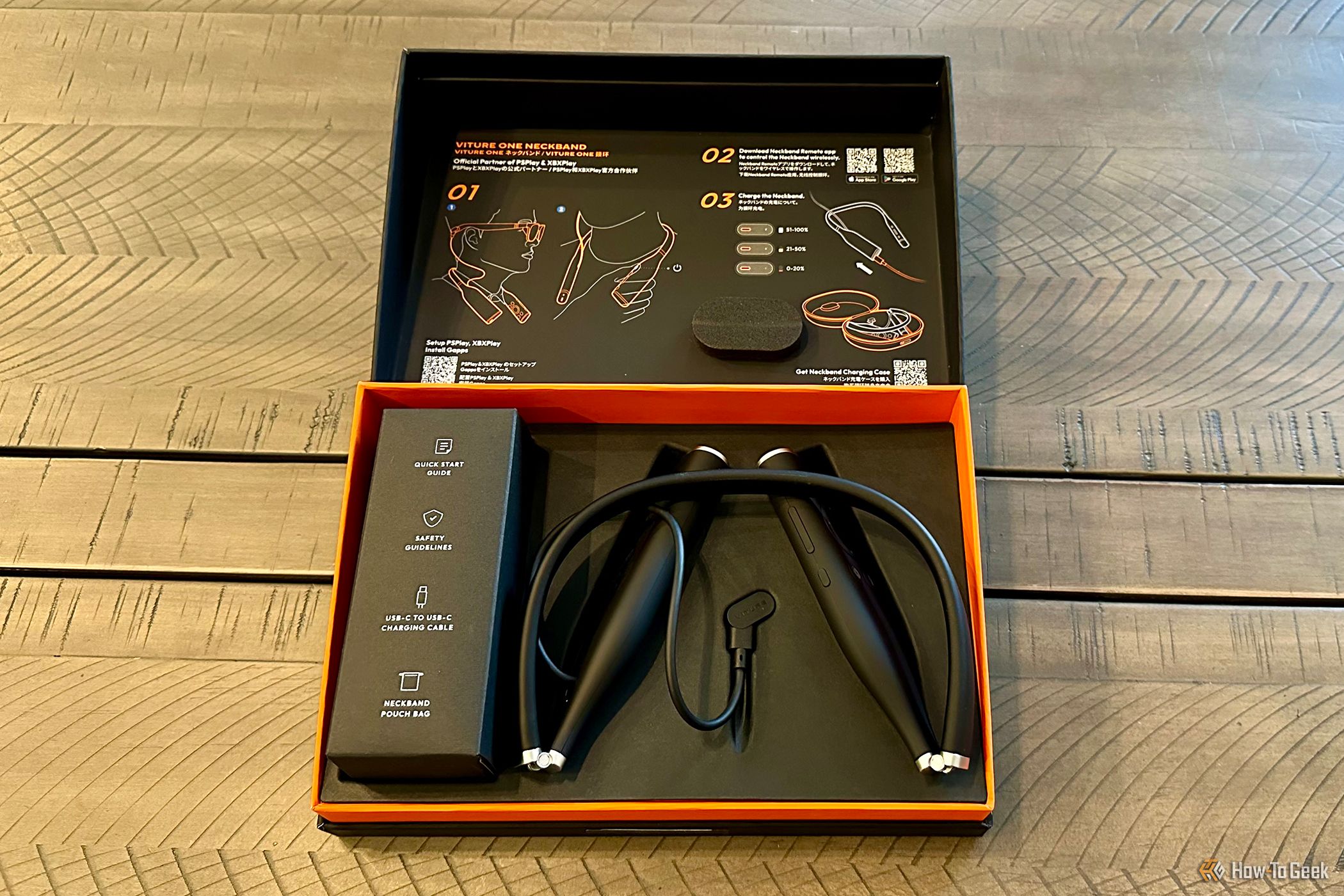
Bill Loguidice / How-To Geek
If you don’t want to worry about what adapters go with what device , or what Pro XR Glasses features are supported, Viture offers a Neckband ($179). It’s a wearable Android-based device that connects directly to the Pro XR Glasses and lasts for a minimum of two hours between charges thanks to its 3,280mAh battery, although it also has a dedicated USB-C port to keep it powered for longer. You can install just about any app from the Google Play store, including video and game streaming apps. Major streaming and other apps are preinstalled, like Netflix, PSPlay , and XBXPlay , the latter two supporting PlayStation and Xbox game streaming, respectively, and are included at no cost with the Neckband.
As expected for an Android-based device, you can connect to a variety of Bluetooth devices, including headphones, keyboards, and controllers. While the company offers the excellent VITURE x 8BitDo Ultimate C Bluetooth Controller ($39), which is also compatible with Nintendo Switch, any Android-compatible game controller should work without issue.

Bill Loguidice / How-To Geek
Unfortunately, I couldn’t connect the Neckband’s Wi-Fi to my home network, just my iPhone’s hotspot, and it took many tries to get a Bluetooth keyboard, trackball, and game controller to connect all at once. I certainly enjoyed some of the demo 3D videos and other content and can see the potential here, but since it has some rough edges with its interface and how it works in general, the few conveniences this device offers are really not worth all the trouble at this point. While I like the Pro XR Glasses, the Neckband is something I’d personally avoid instead of your choice of device and any necessary interface or interfaces.
Should You Buy the VITURE Pro XR Glasses?
There are several VR, AR, MR, and XR glasses on the market right now, but the versatility and quality of the Viture Pro XR Glasses make them a safe bet among the various options. While these glasses do indeed support advanced features like VR and 3D, as well as head tracking, it’s nowhere near as immersive as a real VR headset or Apple’s more AR-centric Vision Pro. Instead, it’s like you’re looking at a big screen display about 10 feet away where advanced features are taking place, not like you’re actually inside. As such, I’d say that if you want a personal, private, and portable video display, and you only occasionally want to dabble in the other features, you’d be making a wise choice. Otherwise, this is probably not the device for you.


VITURE Pro XR Glasses
8/ 10
Extended reality glasses with a 135-inch display and a wide range of connectivity options.
- Title: VITURE Pro XR Glasses - In-Depth Review and Analysis of Your Next Personal Cinematic Experience
- Author: Jeffrey
- Created at : 2024-08-28 15:46:20
- Updated at : 2024-08-29 10:43:12
- Link: https://some-knowledge.techidaily.com/viture-pro-xr-glasses-in-depth-review-and-analysis-of-your-next-personal-cinematic-experience/
- License: This work is licensed under CC BY-NC-SA 4.0.